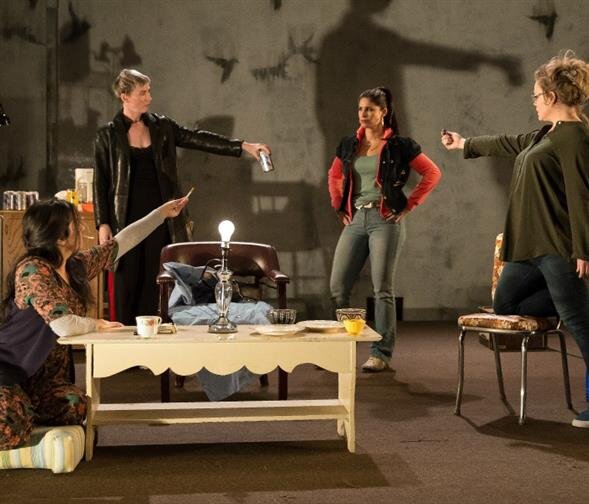How Much Do You Know About Your Cleaning Lady?
Originally published on TDF Stages
View this story online
It's fitting that Martyna Majok's new play queens opens at Lincoln Center Theater's Claire Tow Theater on March 5, 2018. The world-premiere drama explores the challenges of being an immigrant in this country, and next Monday is the deadline President Trump set for Congress to address the fate of 800,000 or so DREAMers: people brought to the U.S. illegally as children.
Like her previous plays Ironbound, about a disillusioned Polish cleaning lady, and Cost of Living, which featured disabled characters, queens is a personal story with profound political resonance. A disparate group of female immigrants shares a basement in Queens where they split living costs down to the penny. They are from different countries and in the U.S. for different reasons, yet they share similar hopes and fears. Renia (played by Ana Reeder), who's from Poland, watches other women come and go back home while she stays put. As the years pass, her relationship with America, as well as with her fellow immigrants, transforms dramatically.
Like Ironbound, queens is inspired in part by Majok's own life. Born in Poland, she moved to the U.S. as a young girl and grew up in New Jersey watching her mother clean wealthier people's houses. Although she pined for Poland for years, an eagerly anticipated trip to her homeland to see family brought an unexpected revelation.
"Their lives had moved on beyond me," she recalls. "They remembered me, but kids were born that never knew me, people had passed away. The country itself had changed in many ways. It was heartbreaking to me. That experience made me think of all the people I'd grown up with who had given up even more than I had."
Of course, queens is also greatly influenced by the ugly ongoing debate about immigrants in this country — both legal and illegal. Majok has been increasingly incensed by Trump's policies and rhetoric, from the proposed Mexican border wall to his pulling the plug on DACA (Deferred Action for Childhood Arrivals), leaving DREAMers in a perilous position.
"What is that mentality that once you're in, you pull the bridge up?" she wonders about U.S. citizens who want the undocumented deported — even if they've been here for years. "At a certain point, being witness to that lit the fire under the play to investigate the American mentality."
The American mentality, and the disparity between expectations and reality, shapes the lives of the characters in queens. The women's nationalities span the globe, but their existence in New York is described as small, consisting mainly of work and sleep. The promise of opportunity goes unfulfilled as they discover their foreign credentials aren't always recognized in the U.S.
For Danya Taymor, who directs, this is achingly familiar. Although her mother had completed medical school in Mexico, she had to take additional exams in the U.S., and still her degree was often looked down on.
"Her identity is definitely always with me when I'm working on this play," Taymor says. "My mom is without country, without a motherland. Also, the experience of her parents [Russian Jews who fled the pogroms and moved to Mexico City], what it means to be an outsider, what it means to be a woman. When she was coming here trying to be a doctor, she was not only a foreigner, she was a woman and not being taken seriously."
With its all-female cast of immigrant characters, queens forces New York audiences to engage with the plight of people they likely pass over every day -- just like Majok's and Taymor's mothers. "It's my dream that the people in this play are seen as human beings first," Taymor said. "What this play really is about is what happens when you shut people out, when you turn your back on people who helped you, and how that actually destroys you."
In queens, that assistance often means a space in the basement. The single room is home to many people, but only contains the basic essentials of everyday life. The women nickel-and-dime each other so they can send as much money as possible to their families back home. Even the amount of milk in a bottle is marked to track if someone sneaks a sip.
It's those details — owing someone $10.26 instead of just ten bucks— that Majok and Taymor hope will impact viewers and give them a sense of what these women go through. They even drew up a list of "educating the audience" points while working on the show to make sure they covered everything they wanted to say as artists and activists.
"I bet a lot of people who come have a cleaning lady," says Taymor. "What is their relationship to that person, or to the person who busses their dishes? What is their relationship to their own history of immigration? How do they consider how they move through the world in terms of all of those things?"

